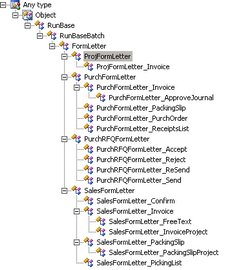static void postSalesInvoice(Args _args)
{
// Define a classvariable according to the
// type of posting being performed
SalesFormLetter_Invoice invoice;
SalesTable salesTable;
;
// Select the salesTable to update
salesTable = SalesTable::find(“SO-101297″);
// Create a new object of the SalesFormLetter_Invoice
// by using the construct-method in SalesFormLetter
invoice = SalesFormLetter::construct(DocumentStatus::Invoice);
// Post the invoice
invoice.update(salesTable,
SystemDateGet(),
SalesUpdate::All,
AccountOrder::None,
false,
true); // Set to true to print the invoice
}
The next screenshot shows the class hierarchy of FormLetter with all its subclasses: we can easily custamize the above logic to post different status updates against sales orders
and purchase orders
Sales (Confirmation, Picking list, Packing slip, Invoice )
Purch (Purchase order,Receipt list, Packing slip, Invoice)

{
// Define a classvariable according to the
// type of posting being performed
SalesFormLetter_Invoice invoice;
SalesTable salesTable;
;
// Select the salesTable to update
salesTable = SalesTable::find(“SO-101297″);
// Create a new object of the SalesFormLetter_Invoice
// by using the construct-method in SalesFormLetter
invoice = SalesFormLetter::construct(DocumentStatus::Invoice);
// Post the invoice
invoice.update(salesTable,
SystemDateGet(),
SalesUpdate::All,
AccountOrder::None,
false,
true); // Set to true to print the invoice
}
The next screenshot shows the class hierarchy of FormLetter with all its subclasses: we can easily custamize the above logic to post different status updates against sales orders
and purchase orders
Sales (Confirmation, Picking list, Packing slip, Invoice )
Purch (Purchase order,Receipt list, Packing slip, Invoice)
